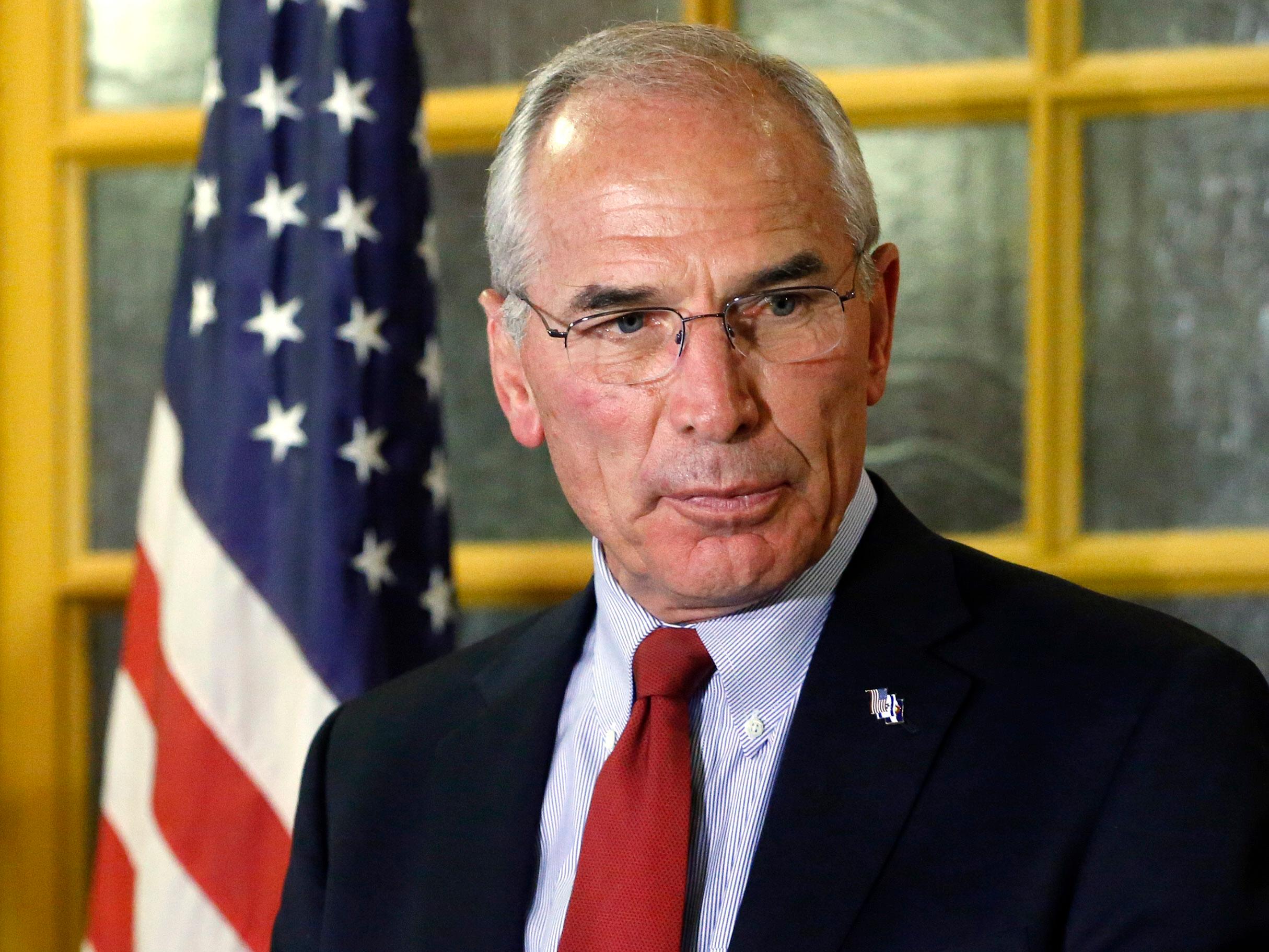
Editor's note: Colorado Matters interviewed Democrat John Hickenlooper as well.
If elected governor, Bob Beauprez would seek to increase the amount of education funding Colorado gets from the federal government and try to gain control of some federal lands. He would continue accepting federal money for Colorado’s Medicaid expansion. Beauprez made those promises, and others, in an extended CPR News interview for “Colorado Matters."
More: Interview with Hickenlooper | Governor race voters guide | More voters guides | Election 2014 coverage
Beauprez, a Republican, is trying to unseat Democrat John Hickenlooper. From 2002-2006, Beauprez served in Congress and then lost his bid to become governor to Democrat Bill Ritter. He is also a former chairman of Colorado's Republican Party, a native of the state and former bank manager. He's currently a buffalo rancher in northern Colorado.
Oil and gas drilling
When talking about oil and gas drilling, one of the most contentious issues in Colorado, Beauprez draws on his own experience as a land owner. Saying the state doesn’t need more laws, Beauprez says he privately negotiated a deal to allow drilling on his property. “This is what we’ve done for a long, long time,” Beauprez says, referring to the state of Colorado. “We’ve had good local control.”
In gubernatorial debates this fall, Beauprez has repeatedly said that an oil and gas drilling commission established by Hickenlooper to advise the legislature on a long-term solution to some communities' concerns about drilling is addressing a problem that doesn’t exist. Hickenlooper helped bring about the commission as part of a deal to keep "local control" initiatives to restrict drilling, as well as measures from drilling proponents, off the ballot this fall. Under the deal, the state also agreed not to pursue a lawsuit against the town of Longmont, which wants to limit drilling there.
Beauprez says he would keep current regulations in place and focus on education. “Never in the history of man have we harvested natural resources better, more efficiently, safer,” he says.
Economy
Throughout the campaign, Beauprez has said Colorado’s economy can do better than it is doing under Hickenlooper’s leadership. The state’s Department of Labor and Employment announced Tuesday that the unemployment rate is down to 4.7 percent, and Chief Economist Alexandra Hall says more than half the jobs the state has added since the recession are in industries that pay above the median level. But, Beauprez says, some parts of the state like Pueblo, Colorado Springs and Grand Junction are still struggling. Earlier this year, CPR News reported on the economies of those cities.
“A good bit of the state is still wondering where the recovery is for them … and that’s where I want to make a difference," he says. Beauprez adds that businesspeople tell him that regulation, more so than taxation, is stalling growth.
“We’ve got a reasonably low tax rate,” Beauprez says. “The biggest challenge we have right now is regulation.”
As an example, he talks about a trucker in northwest Colorado who hauls coal on the state’s highways. The trucker, Beauprez says, has told him that the state government is dictating, “When we cannot be on the roads,” due to adverse weather conditions.
“They’re regulating him out of business,” Beauprez says.
CPR News asked the Beauprez campaign for the name of the driver or the specific regulation, but the campaign was unable to provide them before publication. Amy Ford, spokeswoman for the Colorado Department of Transportation, says there’s no state law saying trucks can’t drive during inclement weather. But, Ford says, sometimes roads to all traffic are shut down to protect public safety.
“We certainly work with our truck drivers when inclement weather might impact them, but there’s no standing rule that would prohibit trucks being on the road in bad weather," she says.
Beauprez also points to a technical school in Denver called SeedPaths that trains students who have struggled with school or have experienced setbacks like homelessness, and helps them get jobs. SeedPaths and founder Jeff Macco have struggled to comply with state regulations, such as a requirement for licensure, he says.
“If it wasn’t for [Macco’s] tenacity, they really would have put him out of business,” Beauprez says.
Looking at the economy more broadly, Beauprez cites a report by the American Legislative Executive Council (ALEC) stating that Colorado’s “economic opportunity” has fallen from 2nd place to 22nd place compared with other states since Hickenlooper took office. ALEC is a conservative policy group, and the report ranks states on policies, challenging Colorado for its property tax rates, $8 an hour minimum wage (higher than the federal $7.25), not being a "right to work" state, and recently legislated tax changes, among other things.
Beauprez says he supports making Colorado a "right to work" state, meaning union membership would be optional, but does not seek to make changes to Colorado’s minimum wage.
“We do have a relatively low minimum wage,” he says.
In addition to the report from ALEC, he points to a report from George Mason University, called “Freedom in the 50 States,” which ranks Colorado as 19th based on its regulatory and tax policies.
Education
On K-12 education, Beauprez has agreed with those who say schools are not adequately funded in Colorado, and as one solution, he says the state should get more money from the federal government for education.
“We’re ranked 50th among the various states in getting federal tax dollars back,” Beauprez says, citing a Census Bureau report based on data from 2011-2012 that includes the District of Columbia.
The only state ranked lower than Colorado is Utah.
“If we were even middle of the pack, we’re talking about $300 million-plus a year of additional funding that Colorado could put into our schools,” Beauprez adds. However, Beauprez does not suggest a specific federal funding source, saying he’s uncertain how the state would go about increasing the amount of federal money for K-12 education. But, he adds, “To say, ‘oh well’... that’s not an acceptable explanation to me.”
Public lands
Beauprez would also seek to gain control of some lands currently managed by federal agencies, saying he would like the state to produce revenue for Colorado by allowing logging, energy extraction, or by another means. About 36 percent of land in Colorado is managed by the federal government.
“We’re not talking about every square inch that the federal government has,” Beauprez says. “Only a small part of it, really.”
He adds that "some limited amount” of land could be sold to private landholders, "but that’s not the objective here.”
He envisions changes in the ownership of some of the lands would come through swaps. The Colorado State Land Board does currently swap lands with the federal government and private landholders when it deems the swaps economically beneficial for the state. The agency is governed by the principle of producing, “reasonable and consistent revenue over time,” according to a spokesperson.
Beauprez says he would be willing to increase the size of the state government to manage public lands newly under Colorado’s control. “I think the state would do a far better job [than federal agencies],” he says.
Healthcare
Beauprez say he's unsatisfied with the Affordable Care Act, and points out that about 20 percent of Coloradans are now on Medicaid -- 1.1 million Coloradans, according to the state’s office of Health Care Policy and Financing (HCPF), out of a population of about 5.27 million people.
Right now the federal government is paying for all of the costs of the Medicaid expansion, and that will phase down to 90 percent over the next few years. Beauprez would continue to accept federal funding for the expansion, despite his concerns about the size of the program.
He incorrectly states that the cost of the Medicaid expansion will, in the future, be split evenly between the federal government and the state. According to HCPF and the federal Centers for Medicare and Medicaid Services, the federal government will pick up 90 percent of the costs of the expansion in perpetuity.
By e-mail following the interview with “Colorado Matters,” Beauprez’s spokesperson Allen Fuller says, “[Beauprez's] concern ultimately is about what the impact of Medicaid expansion will be on the state's budget. There are significant costs, especially the costs of administering Medicaid, that are not covered by the federal government, that will have to come from somewhere in Colorado's state budget.” Hickenlooper said in January 2013 that the Medicaid expansion will save the state money over 10 years.
Beauprez says he would like Medicaid money to go to states as a block grant, a proposal frequently suggested by Republican candidates.
Women’s reproductive rights
Beauprez has in the past supported proposals to limit access to abortions, but if elected governor says he would be committed to his current position.
“I respect people’s opinion; women’s right to that choice," he says. "I know what the law is and my job is to enforce the law."
During this campaign Beauprez has gotten attention for saying during a debate with Hickenlooper that "[an] IUD is an abortifacient," something that causes an abortion.
However, he says, “I think women ought to have the choice of whether to use birth control. I think women ought to have the choice of what type of birth control to use. I just don’t think taxpayers need to be paying for it.”
The American Academy of Pediatrics recently said IUDs and hormonal implants are the most effective forms of birth control for preventing pregnancy.
Marijuana
Like Hickenlooper, Beauprez did not support the legalization of recreational marijuana. In a recent debate, Beauprez suggested he may support making it illegal again. He told CPR News that he’ll “listen to the will of the people” about whether to do that. To start, though, he’ll advocate for enforcing existing laws about public consumption.
“We’re not supposed to be using [marijuana] in public, and on 4/20, there was pictures in the press of hundred, maybe thousands, of people blatantly flaunting the law," he says.









